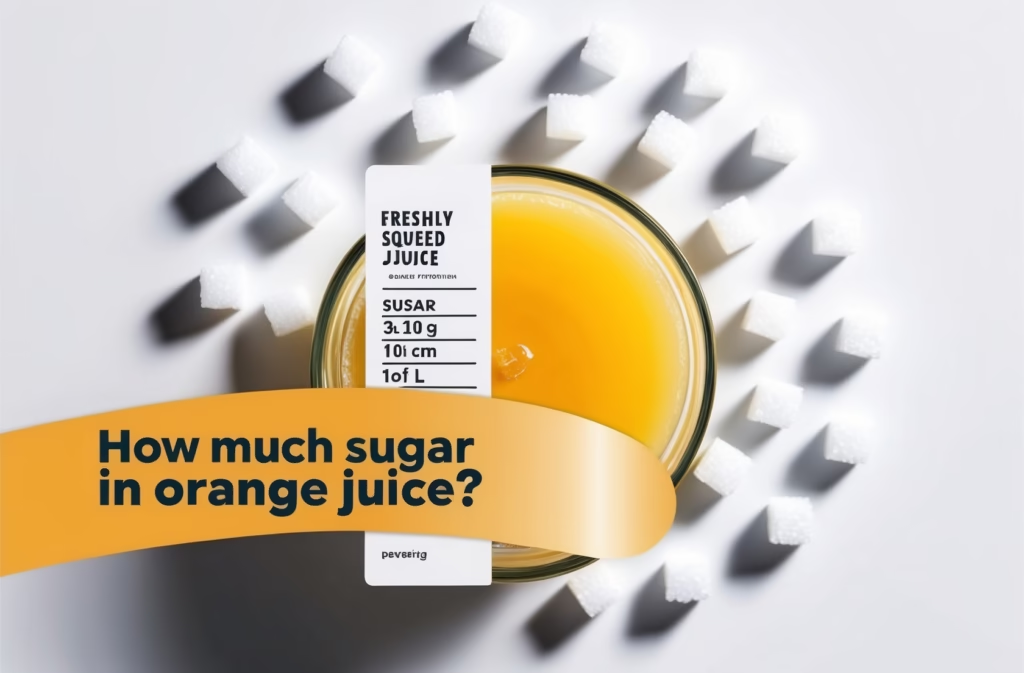How Much Sugar In Orange Juice? Find out the sugar content of orange juice per serving. Discover the surprising facts about Orange Juice Sugar. Learn about healthier alternatives! #SugarContentOrangeJuice #OrangeJuiceSugarPerServing
How Much Sugar In Orange Juice? A Comprehensive Guide
Orange juice is a popular breakfast staple and a refreshing drink enjoyed throughout the day. However, many are concerned about its sugar content orange juice. This comprehensive guide will delve into the specifics of how much sugar in orange juice, exploring factors influencing sugar levels, healthier alternatives, and how to make informed choices about your consumption.
Understanding the Sugar Content Orange Juice
The sugar content orange juice varies significantly depending on several factors. Naturally occurring sugars, primarily fructose and sucrose, are present in oranges. However, processing methods significantly impact the final sugar concentration. For example, commercially produced orange juices often undergo concentration and reconstitution processes, which can affect the sugar levels.
Another crucial factor is the type of orange juice. 100% orange juice, made solely from oranges, will have a different sugar profile than juices that are blended with other fruits or added sugars. Some brands also add sugar or other sweeteners to enhance the flavor, further increasing the sugar content. Always check the nutrition label to understand what you’re consuming.
Orange Juice Sugar Per Serving: Decoding Nutrition Labels
The best way to determine the orange juice sugar per serving is to check the nutrition label. These labels provide essential information, including the amount of sugar per serving in grams and sometimes as added sugars. Pay close attention to the serving size, as the total sugar content will vary depending on how much you drink.
Remember, “total sugars” includes naturally occurring sugars and any added sugars. Ideally, you should choose orange juices with lower total sugar content and minimal or no added sugars. Comparing labels from different brands allows you to make informed choices based on your preferences and dietary needs.
Factors Affecting Sugar Levels in Orange Juice
Several factors contribute to the variability in how much sugar in orange juice:
- Type of Orange: Different orange varieties contain varying amounts of natural sugars. Some oranges are naturally sweeter than others.
- Processing Methods: The method of juicing and processing significantly influences the sugar concentration. Some processes may concentrate the sugars, leading to higher sugar levels in the final product.
- Added Sugars: Many commercially available orange juices have added sugars, syrups, or other sweeteners. These additions dramatically increase the overall sugar content.
- Pulp Content: While not directly impacting sugar, the pulp content can influence the perception of sweetness. Juices with more pulp may seem less sweet because the pulp dilutes the sugar concentration.
How Much Sugar is Too Much?
The recommended daily sugar intake varies depending on individual factors like age, activity level, and overall health. However, general guidelines suggest limiting added sugar intake. The American Heart Association recommends no more than 25 grams of added sugar per day for women and 36 grams for men. Checking the orange juice sugar per serving helps you stay within these limits. Excessive sugar intake is linked to various health problems, including weight gain, type 2 diabetes, and heart disease.
Therefore, moderation is key. While 100% orange juice offers some nutritional benefits like vitamin C, consuming it in large quantities can still contribute significantly to your daily sugar intake. It’s crucial to balance the benefits with potential drawbacks.
Healthier Alternatives and Lower-Sugar Options
If you’re looking to reduce your sugar intake but still enjoy a refreshing juice, consider these options:
- Dilute your orange juice: Mixing orange juice with water can reduce the sugar content per serving. This simple trick makes the juice less concentrated and helps you consume less sugar overall.
- Choose 100% juice with no added sugar: Always check the label to ensure the juice contains only orange juice and no added sugars or sweeteners.
- Explore other fruit juices: Many other fruit juices, such as green apple juice, offer a lower sugar content than orange juice. Consider exploring various options to find a suitable substitute.
- Make your own juice: Squeezing fresh oranges at home allows you to control the sugar content and avoid added ingredients. This is also a great way to enjoy the freshest flavor.
- Try blends: Juices that blend orange with other fruits, like mango-orange juice or pineapple-orange-coconut juice, can offer a flavorful experience with a potentially lower sugar concentration compared to pure orange juice, depending on the proportions.
Beyond Orange Juice: Exploring Other Refreshing Options
If you are looking for low-sugar alternatives, consider exploring other options beyond orange juice. Some excellent choices include:
- Water infused with fruits and herbs: A refreshing and naturally sweet option.
- Unsweetened tea: A healthy and versatile beverage with various flavors.
- Other fruit juices with lower sugar content: Orange-grapefruit juice or other citrus blends can be lower in sugar.
Understanding the Glycemic Index
The glycemic index (GI) measures how quickly a carbohydrate-containing food raises blood sugar levels. Orange juice has a moderate to high GI, depending on the factors mentioned earlier. Foods with a high GI cause a rapid spike in blood sugar, which can be problematic for individuals with diabetes or those trying to manage their blood sugar levels. Choosing lower-GI options or diluting the juice can help mitigate this effect. For detailed information on the GI of various foods, you can refer to resources like the University of Sydney’s Glycemic Index Database: https://www.sydney.edu.au/medicine/health-sciences/nutrition/gi-database/
The Role of Added Sugars in Orange Juice
Many commercially produced orange juices contain added sugars, which significantly increase the overall sugar content and provide little to no nutritional benefit. These added sugars contribute to empty calories, meaning they provide energy but lack essential vitamins, minerals, or fiber. Always check the ingredients list to ensure that your orange juice is 100% juice with no additions. Understanding the difference between naturally occurring sugars and added sugars is crucial for making informed dietary choices.
One excellent resource to further understand the impact of added sugars on your health is the website of the American Heart Association: https://www.heart.org/en/healthy-living/healthy-eating/eat-smart/sugar/added-sugars. This site offers valuable information and guidelines for reducing added sugar intake.
Making Informed Choices About Orange Juice Consumption
Ultimately, the decision of whether or not to consume orange juice comes down to personal preference and dietary needs. While it does provide some nutritional benefits, it’s essential to be mindful of the sugar content orange juice and incorporate it into your diet consciously. By paying attention to nutrition labels, opting for 100% juice with no added sugar, and considering healthier alternatives, you can enjoy the benefits of orange juice without excessive sugar intake.
Consider incorporating other flavorful options like cherry-lime juice or other fruit juice blends to diversify your beverage options and potentially find alternatives lower in sugar. Remember to always read labels and make choices that align with your personal health goals.
Conclusion: Managing Your Orange Juice Sugar Intake
Understanding how much sugar in orange juice is crucial for making informed decisions about your beverage choices. By paying attention to nutrition labels, choosing 100% juice with no added sugars, and considering lower-sugar alternatives, you can enjoy the refreshing taste of orange juice while managing your sugar intake effectively. Remember to always prioritize a balanced and healthy diet.
Share Your Experience!
We’d love to hear about your experiences with managing your orange juice sugar intake! Share your tips, favorite lower-sugar alternatives, or any questions you have in the comments section below. Let’s create a community dedicated to informed choices and healthy living when it comes to how much sugar in orange juice and other beverages.

Frequently Asked Questions: How Much Sugar in Orange Juice?
- How much sugar is in a typical 8-ounce glass of orange juice?
- The sugar content orange juice varies by brand, but an 8-ounce serving generally contains around 20-25 grams of sugar. This is equivalent to roughly 5-6 teaspoons.
- Is the sugar in orange juice natural or added sugar?
- The sugar in orange juice is primarily naturally occurring fructose from the oranges themselves. However, some brands may add extra sugar, so always check the label.
- How does the sugar content orange juice compare to other beverages?
- Orange juice has significantly more sugar than water or unsweetened tea, but less than many sodas or sweetened drinks. It’s important to consider it as part of your overall daily sugar intake.
- What is the orange juice sugar per serving in different types of orange juice (e.g., from concentrate, freshly squeezed)?
- Freshly squeezed orange juice typically has slightly less sugar than orange juice from concentrate, though the difference isn’t always dramatic. Always check the nutrition label for specifics.
- How much sugar is too much in orange juice (or in general)?
- The American Heart Association recommends limiting added sugars to no more than 25 grams per day for women and 36 grams per day for men. Keep in mind that how much sugar in orange juice contributes to your overall daily sugar intake.
- Does drinking orange juice increase my risk of health problems?
- Excessive sugar intake, including from orange juice, can contribute to weight gain, type 2 diabetes, and other health issues. Moderation is key.
- Are there low-sugar options for orange juice?
- Some brands offer reduced-sugar orange juice options, but be aware that these may use artificial sweeteners or other additives. Always read the label carefully.
- Is it better to eat a whole orange instead of drinking orange juice?
- Yes, eating a whole orange is generally considered healthier. It provides fiber, which helps regulate blood sugar levels and aids digestion, something you miss when consuming just the juice.
- How can I reduce my orange juice sugar per serving intake?
- Dilute your orange juice with water, choose smaller servings, or opt for alternative beverages like water or unsweetened tea more often. Check the nutrition label for How Much Sugar In Orange Juice before you buy.
- Where can I find reliable information about the sugar content orange juice?
- Check the nutrition facts panel on the orange juice carton or bottle. You can also consult reputable sources like the USDA FoodData Central website for more detailed information on How Much Sugar In Orange Juice for various brands.

How Much Sugar In Orange Juice? A Chef’s Deep Dive
We all know orange juice is a refreshing and seemingly healthy drink. But how much sugar is actually in that glass? Understanding the sugar content of orange juice is crucial for making informed choices about your diet. This blog post will explore the sugar content of orange juice, examining factors that influence it and providing you with actionable information to manage your sugar intake.
How Much Sugar in Orange Juice Per Serving?
The sugar content of orange juice varies significantly depending on several factors. These include the type of orange used, the processing method (freshly squeezed versus commercially produced), and even the brand. Generally, a single 8-ounce serving of commercially produced orange juice can contain anywhere from 20 to 25 grams of sugar. This translates to approximately 5 to 6 teaspoons of sugar – a considerable amount!
Freshly squeezed orange juice generally contains less added sugar, but the natural sugars present are still significant. The concentration of sugars depends on the ripeness and sweetness of the oranges. You’ll find a lower sugar content in oranges that are less ripe and a higher content in those that are sweeter and riper.
To give you a clearer picture, let’s delve into the specifics of a recipe for freshly squeezed orange juice, and then we can calculate the sugar content more accurately. For a broader range of juice recipes, explore some of our other creations: Mango Orange Juice, Green Apple Juice, or even the zesty Orange Grapefruit Juice.
Factors Affecting Orange Juice Sugar Content
Several factors influence the orange juice sugar per serving:
- Type of Orange: Some orange varieties are naturally sweeter than others. Navel oranges, for instance, tend to be sweeter than Valencia oranges.
- Ripeness of Oranges: Ripe oranges have higher sugar content compared to less ripe ones.
- Processing Method: Freshly squeezed juice will typically contain less added sugar compared to commercially produced juices that often include added sugars, preservatives, and other ingredients.
- Added Sugars: Commercially produced juices sometimes have added sugars or sweeteners.
- Pulp vs. No Pulp: The amount of pulp left in the juice doesn’t significantly impact the overall sugar content.
Understanding these factors helps you make informed decisions about your orange juice consumption and helps you manage your overall sugar intake more effectively.
Recipe: Freshly Squeezed Orange Juice
To truly understand the sugar content in orange juice, let’s prepare a batch of freshly squeezed orange juice. This allows us to minimize added sugars and focus on the natural sugars present in the oranges.
Ingredients:
- 6 medium-sized oranges
Instructions:
- Wash the oranges thoroughly.
- Roll the oranges firmly on a countertop to soften them and release more juice.
- Cut the oranges in half.
- Using a juicer or by hand, extract the juice from each orange half.
- Strain the juice (optional) to remove any seeds or pulp.
- Serve immediately or refrigerate for later.
Nutritional Information (per 8-ounce serving, based on 6 medium oranges)
Note: Nutritional values are estimates and can vary depending on the size and type of oranges used. This data is for informational purposes and does not constitute nutritional advice. Consult a registered dietitian or nutritionist for personalized dietary guidance. This information is partially based on data from the USDA FoodData Central database, but exact values can change based on the specific oranges used.
| Nutrient Name | Amount per Serving | % Daily Value (DV) |
|---|---|---|
| Calories | 110 | 5.5% |
| Protein | 1g | 2% |
| Total Fat | 0.5g | 1% |
| Saturated Fat | 0g | 0% |
| Unsaturated Fat | 0.5g | – |
| Trans Fat | 0g | 0% |
| Total Carbohydrate | 26g | 8.7% |
| Dietary Fiber | 2g | 8% |
| Total Sugars | 21g | – |
| Vitamin C | 100mg | 111% |
| Potassium | 250mg | 7% |
| Calcium | 20mg | 2% |
| Iron | 0.5mg | 3% |
For more delicious juice recipes, try our Cherry Lime Juice or the exotic Pineapple Orange Coconut Juice.
Understanding the Sugar Content: Further Reading
For a more in-depth understanding of sugar’s role in your diet, I recommend consulting resources like the FDA’s information on sugars and the Harvard T.H. Chan School of Public Health’s articles on added sugar. These resources provide valuable insights into the impact of sugar on health.
Summary: The Sweet Truth About Orange Juice
Orange juice provides vital nutrients like Vitamin C and potassium. However, its natural sugar content can be substantial. Freshly squeezed juice is usually a healthier option than commercially produced ones due to lower added sugars. By understanding the sugar content of orange juice and its various influences, you can make more mindful choices about your consumption and maintain a balanced diet.
Call to Action
Now that you know the ins and outs of how much sugar in orange juice, why not try making your own fresh batch today? Share your experience and results with us by leaving a comment below! Don’t forget to share this informative post with your friends and family on social media using #OrangeJuiceNutrition #SugarContent #HealthyEating. Let’s spread the word about mindful juice consumption!

How Much Sugar in Orange Juice? Practical Tips and Health Considerations
Orange juice is a popular breakfast beverage, often touted for its vitamin C content. However, a key consideration is its sugar content. The amount of sugar varies depending on the type of orange, whether it’s freshly squeezed or commercially produced, and even the brand. Generally, a single 8-ounce glass of commercially produced orange juice can contain anywhere from 18 to 25 grams of sugar, a significant portion of your daily recommended sugar intake. If you enjoy blended juices, consider exploring other options like mango orange juice or pineapple orange coconut juice, which might offer a slightly lower sugar content due to the addition of fruits with lower sugar levels.
Freshly squeezed orange juice typically contains less sugar than commercially processed varieties. This is because processing often involves adding sugar or concentrates to enhance flavor and shelf life. The natural sugars in oranges are still present, but the added sugars significantly increase the total sugar content. If you’re watching your sugar intake, freshly squeezed juice is a preferable option. However, even fresh juice contributes to overall sugar consumption.
Choosing alternatives with a lower sugar profile is crucial for maintaining good health. For instance, green apple juice generally has a lower sugar content than orange juice. Other options include diluting your orange juice with water to reduce the sugar concentration. Combining orange juice with other juices, such as a orange grapefruit juice blend can alter the sweetness and overall nutritional profile. Consider exploring other juice options like a cherry lime juice to diversify your choices and potentially reduce your sugar intake.
Health Considerations: High sugar consumption is linked to several health problems, including weight gain, type 2 diabetes, heart disease, and tooth decay. Moderation is key. If you consume orange juice regularly, be mindful of your overall sugar intake from other sources. It’s advisable to limit your consumption to one small glass daily, or even less frequently, depending on your individual health needs and dietary goals. Always consult a doctor or registered dietitian for personalized dietary advice.
Ultimately, the decision about how much orange juice to consume depends on your individual health status and dietary needs. Being informed about the sugar content and making conscious choices will help you manage your sugar intake effectively.